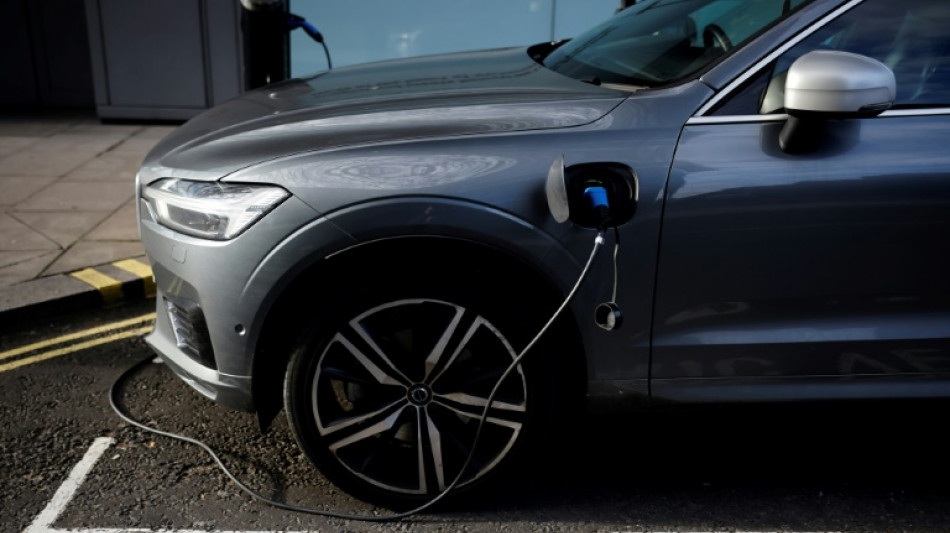
-
 Sri Lanka cyclone caused $4.1 bn damage: World Bank
Sri Lanka cyclone caused $4.1 bn damage: World Bank
-
Billionaire Ellison offers personal guarantee for son's bid for Warner Bros

-
 Tech stocks lead Wall Street higher, gold hits fresh record
Tech stocks lead Wall Street higher, gold hits fresh record
-
Telefonica to shed around 5,500 jobs in Spain
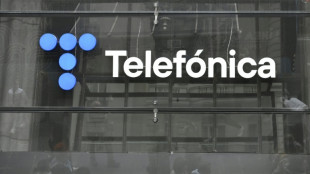
-
 McCullum wants to stay as England coach despite Ashes drubbing
McCullum wants to stay as England coach despite Ashes drubbing
-
EU slams China dairy duties as 'unjustified'
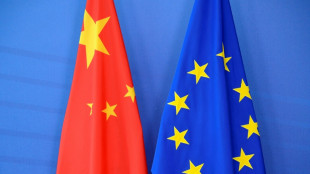
-
 Italy fines Apple nearly 100 mn euros over app privacy feature
Italy fines Apple nearly 100 mn euros over app privacy feature
-
America's Cup switches to two-year cycle
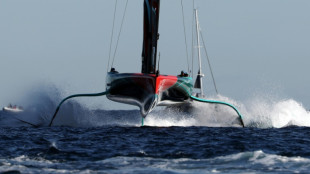
-
 Jesus could start for Arsenal in League Cup, says Arteta
Jesus could start for Arsenal in League Cup, says Arteta
-
EU to probe Czech aid for two nuclear units
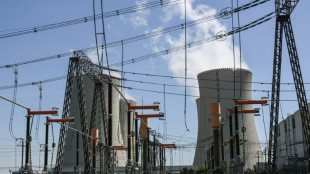
-
 Strauss says sacking Stokes and McCullum will not solve England's Ashes woes
Strauss says sacking Stokes and McCullum will not solve England's Ashes woes
-
Noel takes narrow lead after Alta Badia slalom first run

-
 Stocks diverge as rate hopes rise, AI fears ease
Stocks diverge as rate hopes rise, AI fears ease
-
Man City players face Christmas weigh-in as Guardiola issues 'fatty' warning

-
 German Christmas markets hit by flood of fake news
German Christmas markets hit by flood of fake news
-
Liverpool fear Isak has broken leg: reports

-
 West Indies captain says he 'let the team down' in New Zealand Tests
West Indies captain says he 'let the team down' in New Zealand Tests
-
Thailand says Cambodia agrees to border talks after ASEAN meet

-
 Alleged Bondi shooters conducted 'tactical' training in countryside, Australian police say
Alleged Bondi shooters conducted 'tactical' training in countryside, Australian police say
-
Swiss court to hear landmark climate case against cement giant

-
 Knicks' Brunson scores 47, Bulls edge Hawks epic
Knicks' Brunson scores 47, Bulls edge Hawks epic
-
Global nuclear arms control under pressure in 2026

-
 Asian markets rally with Wall St as rate hopes rise, AI fears ease
Asian markets rally with Wall St as rate hopes rise, AI fears ease
-
Jailed Malaysian ex-PM Najib loses bid for house arrest

-
 Banned film exposes Hong Kong's censorship trend, director says
Banned film exposes Hong Kong's censorship trend, director says
-
Duffy, Patel force West Indies collapse as NZ close in on Test series win

-
 Australian state pushes tough gun laws, 'terror symbols' ban after shooting
Australian state pushes tough gun laws, 'terror symbols' ban after shooting
-
A night out on the town during Nigeria's 'Detty December'

-
 US in 'pursuit' of third oil tanker in Caribbean: official
US in 'pursuit' of third oil tanker in Caribbean: official
-
CO2 soon to be buried under North Sea oil platform

-
 Steelers edge Lions as Bears, 49ers reach playoffs
Steelers edge Lions as Bears, 49ers reach playoffs
-
India's Bollywood counts costs as star fees squeeze profits

-
 McCullum admits errors in Ashes preparations as England look to salvage pride
McCullum admits errors in Ashes preparations as England look to salvage pride
-
Pets, pedis and peppermints: When the diva is a donkey

-
 'A den of bandits': Rwanda closes thousands of evangelical churches
'A den of bandits': Rwanda closes thousands of evangelical churches
-
Southeast Asia bloc meets to press Thailand, Cambodia on truce

-
 As US battles China on AI, some companies choose Chinese
As US battles China on AI, some companies choose Chinese
-
AI resurrections of dead celebrities amuse and rankle

-
 Parallel Society Reveals Lineup for 2026 Lisbon Edition - A Cross-Genre Mashup of Cultural and Tech Pioneers
Parallel Society Reveals Lineup for 2026 Lisbon Edition - A Cross-Genre Mashup of Cultural and Tech Pioneers
-
Ai4 2026 Announces Dynamic Keynote Panel Featuring Geoffrey Hinton, Fei‑Fei Li & Andrew Ng

-
 NESR Becomes First Oilfield Services Company to Commission Original Artwork Created from Recycled Produced Water
NESR Becomes First Oilfield Services Company to Commission Original Artwork Created from Recycled Produced Water
-
SMX Strikes Joint Initiative with FinGo & Bougainville Refinery Ltd to Deliver Verifiable Identification for Trillion Dollar Gold Market

-
 Blue Gold and Trust Stamp Execute Strategic LOI to Develop Biometric, Passwordless Wallet Infrastructure for Gold-Backed Digital Assets
Blue Gold and Trust Stamp Execute Strategic LOI to Develop Biometric, Passwordless Wallet Infrastructure for Gold-Backed Digital Assets
-
SK tes Announces Grand Opening of New Shannon Facility, Marking a Milestone for Sustainable Technology in Ireland

-
 FDA Officially Confirms Kava is a Food Under Federal Law
FDA Officially Confirms Kava is a Food Under Federal Law
-
Greenliant NVMe NANDrive(TM) SSDs Selected for Major Industrial, Aerospace and Mission Critical Programs

-
 World Renowned Law Firm Grant & Eisenhofer Files Class Action Lawsuit Against Canadian Banks CIBC and RBC Alleging Illegal Stock Market Manipulation of Quantum BioPharma Shares
World Renowned Law Firm Grant & Eisenhofer Files Class Action Lawsuit Against Canadian Banks CIBC and RBC Alleging Illegal Stock Market Manipulation of Quantum BioPharma Shares
-
NextTrip Announces Pricing of Private Placement Financing of $3 Million

-
 Namibia Critical Metals Inc. Receives Proceeds of $1,154,762 from Exercise of Warrants
Namibia Critical Metals Inc. Receives Proceeds of $1,154,762 from Exercise of Warrants
-
Shareholders Updates


Electric car batteries could be key to boosting energy storage: study
Electric car batteries could be used to boost power storage in the future, injecting electricity into the grid during times of scarcity or storing electricity during periods of excess, a new study found Tuesday.
Renewable energy is essential for the Paris Agreement goal of limiting global warming to well below two degrees Celsius, but the need to scale up quickly and the intermittency of wind and solar have raised concerns about meeting electricity demand.
One way to help solve this problem is boosting the storage capacity of electricity grids, so that even when there is no sun or wind energy supply won't be interrupted.
New research published Tuesday found that electric car batteries could help boost short-term grid storage in times of increased demand or lower supply, either by setting up "vehicle-to-grid" or "second use" schemes.
"Harnessing this potential will have critical implications for the energy transition," said the study published in Nature Communications.
A "vehicle-to-grid" approach would allow drivers to connect car batteries to the grid for short term-storage when needed, the authors said.
For example, commercial fleets could inject power into the grid when at a depot.
"Second-use" schemes would allow drivers to sell or donate car batteries once they can no longer be used to power vehicles, which is generally when their capacity falls below 70 to 80 percent.
- Micro-payments -
Even a low level of participation from drivers could make a big difference, the researchers said.
"Low participation rates of 12 to 43 percent are needed to provide short-term grid storage demand globally," study co-author Chengjian Xu, of Leiden University in The Netherlands, told AFP.
"Short-term grid storage demand could be met as early as 2030 across most regions", he added, saying this was a conservative estimate.
By 2050, it would exceed the storage capacity required to help limit global warming to well below 2C, as outlined by the International Renewable Energy Agency.
The work examined global data -- including from the main electric car battery markets in China, India, the European Union and the United States -- taking into consideration average driving distances, driver behaviour and temperature, all of which can affect car battery health.
The authors said governments should introduce incentives and regulations to ensure vehicle-to-grid and second use schemes can take off.
"This can include market-based efforts such as micro-payments for services to the grid," Chengjian said, adding that vehicle-to-grid use would have little harm on battery life.
Some car firms such as Hyundai and Renault are already testing vehicles equipped with vehicle-to-grid technology, while some Teslas are already compatible.
The International Energy Agency (IEA) estimates that there will be some 200 million electric vehicles sold in 2030 -- about 20 percent of all cars sold -- an 11-fold increase from today's numbers.
IEA analyst Luis Lopez told AFP using car batteries as short-term storage was "quite promising but it's not a silver bullet", since it would provide less than one percent of storage needed under a net zero by 2050 scenario.
It would also require proper "communication" between the power system and the electric cars.
"If the power system, EVs (electric vehicles) and charging infrastructure all speak the same language, it is easier to aggregate more vehicles for power system needs".
Y.Kobayashi--AMWN